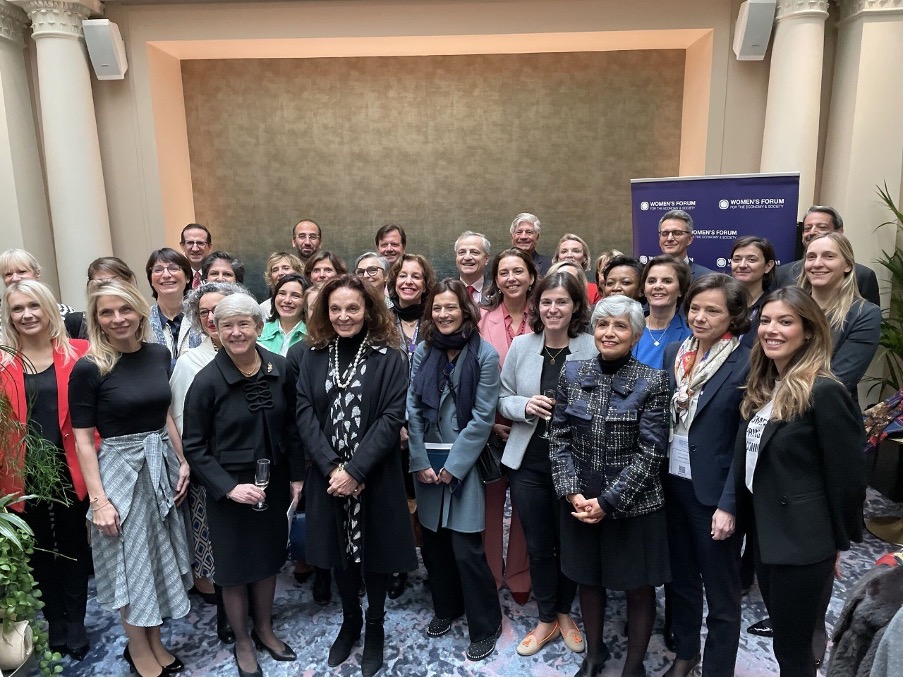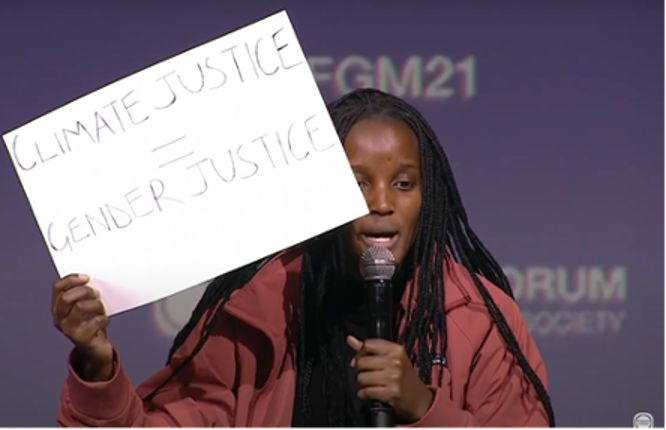Here’s what we take away from the Women Forum Edition 2021:
As COP26 closes, actionable steps to create a sustainable future are underway. But are these steps embracing equality and inclusion? According to the SHE Changes climate activist campaign, only 16% of the COP26 Climate Conference Leadership were Women. When it comes to making decisions towards global issues, the global perspective seems to be skewed without the equal representation of women. According to the Women’s Forum, the years of pandemic crisis have set back the fight on gender equality by 36 years.
This year Women’s Forum Global Meeting 2021 gathered 170 incredible leaders, speakers, activists, and change-makers from different generations, backgrounds, and all walks of life. The five-day programme provided was an opportunity to look at global issues from a female lens and provide us with a fresh new perspective and solutions.
This year’s edition focused on: Climate Action, Artificial Intelligence, STEL, Health, Business for Good and Inclusion. These issues are important as these are sectors where women are discriminated against the most and can lead us to crucial progress towards a positive world.

Here are our five takeaways:
1. Climate Crisis Is a Social Crisis
The programme opened with a panel on Business for Climate Justice saw the continuation of the discussion about the disproportionate impact of the climate crisis on women. The effects of the climate crisis are not the same for everyone, and women worldwide will face danger to their survival. Over 80% of the displaced by climate-related disasters and changes around the world are women and girls.

Alexandra Palt, Executive Vice President of L’Oréal, highlighted that climate change had exacerbated inequalities, and these inequalities will put in danger women’s survival in any part of the world. Collective action and women being at the frontline of the solutions will drive impact towards a sustainable future.
We also witnessed the panellists highlighting the role of businesses and other organisations to collectively support women’s health while developing long–term approaches that include social, behaviour and policy drivers that affect every life stage. We also saw the discussion highlighting gendered ageing and inclusivity of workforces where they can provide opportunities to stay longer with women and support them through the transitions that have taken place in women’s health through their life stages.
2. Young Generation
In this conference, we heard concerns and a bold call for transformation from the next generation. Young people have been at the heart of climate and social issues all over the world. They are fighting for their future and voicing their opinions loud and clear.
Anuna De Wever, a Belgian climate activist, highlighted that the transformation towards a just society would be possible only if we challenge the blueprint because it doesn’t work anymore.

Vanessa Nakate, Founder of the Green School project, brought a strong voice to bring to reality the issues of girls’ education and climate justice. She highlighted those women and girls are at the front line of the climate crisis across many societies. Many girls have to drop out of school or face the risk of early marriages as the climate crisis pushes families into poverty.
This youth voice, amongst many others, demand a positive future for women by tackling the climate crisis. We need more girls to be educated, and women empowered to bring effective progress to the climate issue.
3. Inclusive and Equal World for Women in TECH
For women to be equal actors and decision-makers in all spheres, we need to create an inclusive environment where women are given the education, atmosphere and opportunities to solve the world’s problems. The role of technology and innovation is key to challenging the climate and social issues in the world. Our economies and societies are missing on the great solutions and potential of women as they are continuously under-represented in technology.
We saw the programme dedicate a whole day to discuss the importance of women acquiring STEM skills and promoting inclusive and responsible AI for all.
Audrey Tcherkoff, Managing Director of the Women’s Forum for Economy & Society, highlighted that only 20% of engineers worldwide are women. This under-represented topic got much-needed attention as women are facing barriers to entering the STEM field.
Various panellists acknowledge and discuss the need for women in the field of STEM and AI and their immense contributions in this field till now. STEM skills and AI are creating a majority of future jobs, and they are instrumental to achieving a more sustainable and inclusive future for us all. Equal access to STEM skills and fostering inclusive and responsible AI is an urgent matter and a much-required issue to solve if we want to unlock diverse perspectives and solutions towards shaping our sustainable future.
4. Empowering Women Entrepreneurs
Women Entrepreneurship and underrepresented minorities are an important part of building an inclusive society. The economy will thrive only when women and men equally participate in entrepreneurship and build a positive future.

Fares Sayegh, Senior Vice President Supply Chain, P&G, talks about the moral obligation that companies like theirs have to have a big role as a force for good and force for change. At the same time, it is good for business, impactful on the community.
Women-owned and women-led enterprises have to be supported in terms of mentorship, finance, outreach, and psychological support. It is important to acknowledge and support purposeful and courageous leaders who are taking steps to change the world and provide creative and innovative solutions to our global issues. We saw that panellists tried to tackle specific issues of scaling up, finance and mental health and bring out the power of women entrepreneurship in creating a sustainable and inclusive future for us all.
5. Power of Purpose at the Heart of Business
Businesses and organisations have to adopt purpose at the heart of their systems, but leadership and power also play a huge role in choosing that purpose. The programme discussed the instrumental role of power and purpose to build a sustainable future and how purpose-led women leadership are already making executive decisions for businesses and organisations towards a positive world.
Diony Lebot, Deputy CEO, Société Générale, talks about business models and how women are heading the transformation in business models to include the purpose for environmental and social impact. She highlights that has seen first-hand that at Société Générale, businesses that women lead are businesses that have shifted their business model to align their strategies with the Sustainable Development Goals. She mentions that women are more willing to take a different approach to business models since they were not part of the decisions that led us here.
Our conclusion:
Building an inclusive world needs to be shaped by purpose and power coming from diverse leaders worldwide. Our biggest challenges cannot be solved without embracing the diversity of perspectives and solutions women can bring in various forms. When women take the opportunity to create change, it does build better futures.